
Herbal Supports for Fall
Table of Contents
What is Wei Qi?
Welcome back to our journey through the rich tapestry of Autumn in Chinese Medicine! In our previous blog, we talked about nutritional choices for a healthful Autumn season, and shared some of our favorite recipes. Today, our exploration leads us to a vital aspect of Autumn well-being: The fortification of Wei Qi, your body's guardian and first line of defense. Join us as we unravel the secrets of this crucial energy and discover how lifestyle choices and herbal support can enhance your wellness in this transitional season.
It's no coincidence that upper respiratory infections with coughing tend to strike hard and fast as soon as the first crisp Autumn breeze rolls around. The viral pathogens that produce these symptoms are present in our environment year-round, so why is it that they seem to wreak so much more havoc in the Fall? Well, it's all about the Lungs, and their connection to the largest organ in your body: Your skin!
As far back as 1851, Western science has demonstrated that respiration- the exchange of carbon dioxide and oxygen- takes place not only in the lungs, but also at the surface of the skin. Chinese Medicine observed this connection between the Lungs and the skin at least 1000 years previously! According to TCM, the Lungs are responsible for opening and closing the pores in the skin. This energetic movement at the surface is known as Wei Qi, and it is your body's frontline sentinel. Under the command of the Lungs, Wei Qi protects us from invading pathogens in the environment like viruses and bacteria. When our Lungs are healthy and our Wei Qi is flowing smoothly at the surface, our body is quick to recognize and respond to these invaders, often neutralizing them before they can penetrate deeper and make us sick.
Here's where it gets really intriguing. In the Autumn, temperatures often vary widely throughout the day: A crisp morning turns to a warm, sunny afternoon, which fades into a cold and windy evening. The pores close in the morning to retain heat, open wide in the middle of the day, and slam shut again when the sun goes down. What happens to the pathogens that slipped in while the surface was open? They're trapped! When the immune system recognizes the intruder, it fights back with symptoms like fever, increased mucus production, and coughing to expel the pathogen. Ever wonder why it's called "catching a cold?" Now you know!
Simple steps to support your Wei Qi
So, how can we help our bodies in this dance with the changing winds of Autumn? First, we want to keep our Lungs and Wei Qi strong and protected. But if we do get sick, we want to help our bodies to push the invaders out through the elimination pathways, and then we want to re-establish and regulate the smooth flow of Wei Qi so that we aren't vulnerable to re-infection. And here's how we do that:
❧ Protect Your Wind Gate: In TCM, the base of the skull (or occiput) is known as the Wind Gate. Exposure to wind or cold on this part of the body is particularly disruptive to the Wei Qi. We don't care if it's a scarf, neck gaiter, turtleneck, or hoodie, just keep your neck covered!
❧ Stay Hydrated: As Autumn ushers in dryness, it's essential to keep your body hydrated. Dry Lungs can lead to respiratory inflammation, which leads to the body trying to lubricate the dry mucus membrane tissue by creating mucus. Embrace foods like pears and bone broth to keep your Lungs moist and healthy. These yin tonics are essential to prevent dryness and maintain skin and respiratory well-being.
❧ Clear Mucus Congestion: Chronic mucus, whether from allergies or inherent constitution, can harbor pathogens. Opt for foods that clear this congestion, such as those rich in pungent flavors, damp-draining properties, and warmth. Say goodbye to dairy, refined sugars, and overly processed foods that can exacerbate mucus buildup.
❧ Eat Warm and Nourishing Foods: Consume warming foods like soups and hot drinks like teas and lemon water. This helps to warm the center, specifically the Spleen. The Spleen TRANSFORMS DAMPNESS. If you're phlegmy, you need your Spleen to be warm and happy so it can clear out the mucus. The Spleen is also the commander of your lymphatic system, which plays a big role in your immune system as well. Keep it happy with hot foods and hot drinks.
❧ Sweat it out: When the pores are open and sweating, the Lungs are also open and dilated. This is especially important with coughs, bronchial congestion, tightness in the lungs and chest, wheezing, etc. We break a sweat to open the lungs, push the pathogen back to the surface, and restore the healthy circulation of Wei Qi. As soon as you notice that stiff neck, scratchy throat, stuffy head, or achy body, bundle up and break a sweat!
Herbal supports for your medicine cabinet
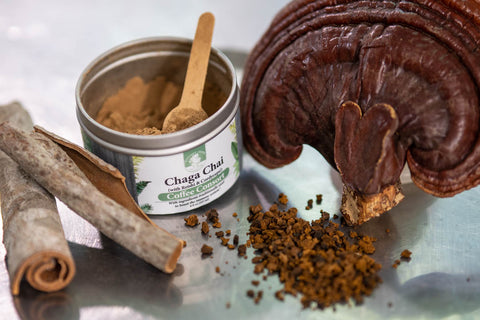
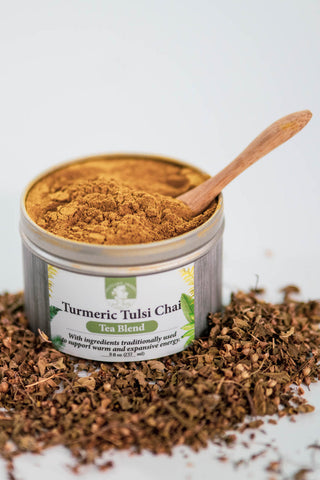
For general maintenance of the immune and digestive systems, keep enjoying your Chaga Chai and Turmeric Tulsi Chai. Both of these delicious and functional teas are intended for daily use to keep the Spleen and Stomach strong, with warming spices like clove, cinnamon, nutmeg and more. They also reduce inflammation, support the immune system, and calm the mind with medicinal mushrooms like chaga, cordyceps and reishi, and herbs like tulsi and turmeric. If you haven’t tried them yet, now is the time to build a tasty daily ritual for yourself, my friend!
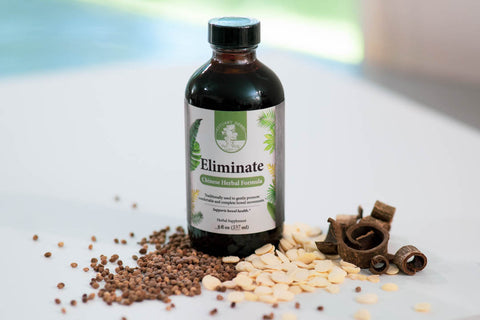
Eliminate is a great formula to keep on hand if your bowels are starting to feel dry, or if constipation is an issue. This formula adds healthy body fluid to the Lung and Large Intestine to reduce dryness, and stimulates the healthy downward flow of Qi through the Large Intestine to empty the bowels.
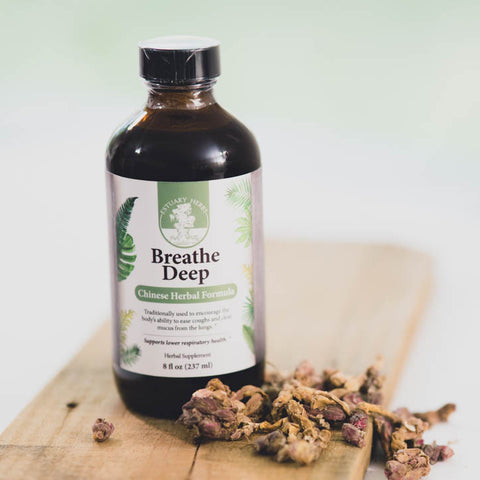
Breathe Deep is an ABSOLUTE must this season for your medicine cabinet. Don’t wait until you are coughing to order it. We’ve already seen lots of bronchitis and respiratory viruses coming up this year, and have sent many patients home with Breathe Deep to stop the cough, get the mucus out, and strengthen the Lung and immunity. Based on what I’ve seen so far this season, this is going to be a cough-heavy Autumn, so keep this one on hand, you will be glad you did.
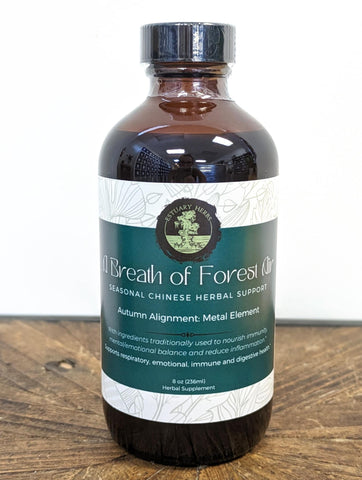
And last but not least, our special seasonal alignment formula: Breath of Forest Air! Many of you will remember this formula from Autumns past. It’s piney, sweet and fragrant. This formula feels like walking through an old growth pine forest, taking a deep breath, and letting it all go. This formula is good for daily use OR as needed. It helps us gently support both Lung and Large Intestine health so that we can live in alignment with the Autumn seasonal Qi and feel our best. I, personally, am so excited to work with this year’s version of Breath of Forest Air. This formula shifts a little bit each year based on current collective health needs, but the overall taste and energy of this formula is the same: delicious, comforting, laying down of our burdens.
Here’s to a happy, cozy, healthy Fall my friends! I love this time of year and am looking forward to diving into all of the Autumny-goodness that the season brings. Join us on Instagram for more Fall health inspiration and information. For now, I’ll leave you with a quote from one of my favorite classic Chinese Medicine texts, Huang Di Nei Jing Su Wen, that helps us better understand the seasonal Qi:
In the three months of autumn,
they denote taking in and balance.
The qi of heaven becomes tense.
The qi of the earth becomes bright.
Go to rest early and rise early,
get up together with the chicken.
Let the mind be peaceful and tranquil, so as
to temper the punishment carried out in autumn.
Collect the spirit qi and
cause the autumn qi to be balanced.
Do not direct your mind to the outside and
cause the lung qi to be clear.
This is correspondence with the qi of autumn and
it is the Way to nourish gathering.
opposing it harms the lung.
In winter this causes outflow of undigested food and
there is little to support storage.
If one acts contrary to the qi of autumn, then
the major yin does not collect.
The lung qi burns and there is fullness. *
*Huang Di nei jing su wen An Annotated Translation of Huang Di’s Inner Classic – Basic Questions Volume I: Chapters 1 through 52 Paul U. Unschuld and Hermann Tessenow in Collaboration with Zheng Jinsheng